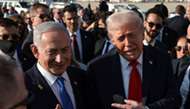▶ If the West punishes Iranians, it may benefit their unpopular leaders.
WASHINGTON
President Obama has vowed to keep the pressure on Iran over its nuclear program after this month’s meeting in Geneva, and his advisers said the United States was intensively recruiting other nations to join in a harsher economic embargo against Tehran should diplomacy fail.
But as the focus on sanctions intensifies, a review of the United States’ experiences in enforcing its own longstanding restrictions on trade with Iran suggests it would be difficult to quarantine the Iranian economy.
Black market networks have sprouted up all over the globe to circumvent the sanctions. A typical embargo-busting scheme was detailed in a plea agreement filed in federal court here on September 24, the day before Mr. Obama and European allies announced the existence of a previously undisclosed Iranian nuclear enrichment facility near Qum.
In the court filings, a Dutch aviation services company and its owner admitted that they had illegally funneled American aircraft and electronics components to Iran from 2005 to 2007. Under the scheme, Iranian customers secretly placed orders with the company, which served as a front, buying the parts and having them shipped to the Netherlands, Cyprus and the United Arab Emirates. The materials were then quietly repackaged and shipped on to the real buyers in Iran.
The Dutch company was eventually caught. But the ease with which it had operated until then illustrates a key hurdle facing the United States: even if diplomatic challenges can be overcome to persuade countries with significant economic ties to Iran, like China, to approve sanctions, it is virtually impossible to make an embargo airtight.
“The Iranians have a lot of experience at this point in evading sanctions,” said Michael Jacobson, an intelligence and sanctions specialist at the Washington Institute for Near East Policy. “They are adaptable, learn from mistakes, see where the United States cracks down and move elsewhere. And on the part of businesses, there is a lot of willful blindness.”
On October 1, Iranian officials met in Geneva with representatives from the United States and other world powers. At that session, the Iranians pledged to give nuclear inspectors access to its clandestine enrichment facility and to ship most of its openly declared uranium outside the country to be further enriched by France or Russia.
While viewed as progress, the meeting drew further attention among diplomats to the role of possible new sanctions. To hold Iran to its pledges, and to prevent it from dragging its feet on the larger objections to its nuclear program, officials said Iran would need to feel a credible threat of punitive measures.
“If you don’t put yourself in a position where you can act on the pressure track, you’ll be less likely to have the engagement track work,” said a highranking administration official, who spoke on the condition of anonymity because of the delicacy of the matter. “The key is for the Iranians to see both sides of this.”
The United States is refusing to take any measures off the table, even an embargo of gasoline and other fuel. European countries fear such measures would inflict misery on the Iranian people, and drive them into the arms of an unpopular government.
Existing sanctions have had some practical consequences. In Tehran, the power goes out regularly, a result of a shortage of electricity generators, which are on the list of prohibited goods because of their potential for military use. That did not happen a decade ago.
Still, the experience of the United States in policing its own unilateral economic sanctions - which were imposed after the 1979 hostage crisis and expanded several times since then - shows that restrictions are more likely to drive up prices of banned foreign goods than to stop them from flowing into Iran. The world is full of rogue nations and smugglers, and other nations may not be as willing as the United States to police sanctions rigorously.
The guilty plea by the Dutch avionics company late last month was just the latest in a string of indictments against several hundred such defendants since 2007, when the Bush administration significantly increased efforts to enforce the United States’ own trade restrictions with nations like Iran.
In cases over the past few months alone, prosecutors have accused defendants of illegally routing fighter jet parts to Iran through Colombia, electronic components through Malaysia and helicopter parts through Singapore. Accused intermediaries have been in places including Ireland and Hong Kong.
Financial sanctions have also been violated. In January, the London bank Lloyds TSB agreed to pay $350 million in fines for hiding the involvement of entities in countries including Iran on wire transfers with United States banks over a 12-year period. In 2006, regulators fined the Dutch bank ABN Amro for similar sanctions-busting dealings from 1997 to 2004.
Mr. Jacobson said that even strict sanctions, enforced with broad international support, would be unlikely to seal off a country as large and complex as Iran.
“While it’s unrealistic to expect that you can isolate Iran from the international economy,” he said, “the narrower and more realistic goal of raising their cost of doing business may change their leaders’ calculations.”
스마터리빙
more [ 건강]
[ 건강]이제 혈관 건강도 챙기자!
[현대해운]우리 눈에 보이지 않기 때문에 혈관 건강을 챙기는 것은 결코 쉽지 않은데요. 여러분은 혈관 건강을 유지하기 위해 어떤 노력을 하시나요?
 [ 건강]
[ 건강]내 몸이 건강해지는 과일궁합
 [ 라이프]
[ 라이프]벌레야 물럿거라! 천연 해충제 만들기
 [ 건강]
[ 건강]혈압 낮추는데 좋은 식품
[현대해운]혈관 건강은 주로 노화가 진행되면서 지켜야 할 문제라고 인식되어 왔습니다. 최근 생활 패턴과 식생활의 변화로 혈관의 노화 진행이 빨라지고
사람·사람들
more
“취미생활로 다진 친목… 선후배들과 만든 모교사랑”
사진러브한인 사진 동호회 사진러브(회장 크리스 고)는 13일 용수산에서 송년모임을 갖고 한 해를 마무리하는 뜻깊은 시간을 가졌다. 이날 모임에…

[홀인원] 이상원 박사
일반외과 전문의 이상원(왼쪽) 박사가 지난 9일 뉴포트비치 소재 골프장 9번 홀(152야드)에서 레스큐 클럽으로 친 샷이 그대로 홀에 빨려 들…
[송년행사 게시판] 재미시인협회
재미시인협회(회장 지성심)는 오는 20일 오후 4시 가든스윗호텔에서 한 해를 마무리하며 동인지 ‘외지’ 제35집 출판 기념회와 ‘제23회 재미…
[송년행사 게시판] 향군단체 연합
6.25 참전유공자회와 대한민국 육군협회 등 남가주 지역 향군 단체 연합은 19일 오전 11시30분, 용궁에서 송년 행사를 개최한다. 드레스코…
[송년행사 화보] “이웃과 함께 나누고 지인과 함…
KYCC13일 윌튼 플레이스 초등학교에서 열린 ‘한인타운청소년회관(KYCC) 홀리데이 카니발’이 성황리에 막을 내렸다. 올해는 KYCC 창립 …
많이 본 기사
- “산타 지금 어디쯤?”…한국서도 70년 전통 전화 안내 즐긴다
- 아마존, 키보드입력 데이터 분석해 위장취업 北노동자 적발
- ‘공천개입’ 이준석 첫 특검 출석… “尹과 공범엮기 무리한 시도”
- 청와대 내년부터 본격화…여민관 ‘정책허브’로
- ‘중독유발 비판’ 챗GPT, 아동보호 기능 이어 ‘친절함 정도’ 도입
- ‘反트럼프’ 공화 큰손, 작년 대선에만 약 5억4천800만달러 썼다
- 엡스타인파일 공개 후폭풍…법무부 ‘트럼프 삭제’ 의혹 선긋기
- 머스크 재산… 사상 초유 7천억달러 돌파
- 美, 우크라戰 종전 중재 속도…마이애미서 우크라·러 연쇄회동
- 美, 베네수 연안서 유조선 추가 나포…긴장 또 고조될 듯
- ‘부상 아웃 공식 확정’ 이강인, 절뚝일 때부터 이상했다 “왼쪽 허벅지 근육 이상”... 폼 최고였는데 아쉬워
- ‘열애설→결별설 겪은’ 제니·지드래곤, 단둘이 ‘MMA’ 대상 쓸어갔다
- 위성락 “내년부터 농축·재처리·핵잠 한미협의 동시다발 진행”
- ‘SNS검증’ 美비자심사 지연에…빅테크, 또 직원 출국자제 권고
- 신민아♥김우빈, 결혼식날 전한 깜짝 소식..3억 기부한 예비 부부
- ‘미소천사’ 김아랑, 너무도 진솔했던 ‘은퇴 이유’ 고백 “경기 후 아쉬움 아닌 고마움 들어 결심했다”
- 최화경 화가 개인 작품전시회
- 美·이집트 등 4개국, 가자 평화구상 진전·후속조치 논의
- [건강포커스] “밤에 더 자주 깨는 어르신, 다음 날 인지수행 능력 떨어져”
- ‘새댁’ 함은정, 결혼식 하자마자..내조의 여왕
- 尹 김건희특검 첫 조사 8시간 반 만에 종료…6개 혐의 모두 부인
- 교황, 전세계 추기경 바티칸 소집…내달 7∼8일 첫 회의
- 젤렌스키 “우크라 선거 방식, 푸틴이… 1
- 트럼프, ‘바이든 임명’ 직업 외교관 출신 대사들 대거 소환
- ‘손예진♥’ 현빈, 학부모 모드ON.. “아들이 배우 한다면? 하..” 한숨
- 요르단 “美 시리아 IS 공습에 참여…안보 위협 저지”
- “네타냐후, 트럼프 만나 ‘이란 추가 타격’ 설명 계획”
- ‘이젠 SD 송성문’ 3루엔 ‘3억 5000만 달러’ 마차도 버티는데... 단장이 답했다 “다양한 역할 소화할 것”
- 개명 하루만에 케네디센터 외벽에 ‘트… 1
- 대북제재 완화 시그널… 이 대통령, … 1
- 시민권 박탈 착수⋯매달 200명 1
- 신민아♥김우빈, 결혼식 날 웨딩 사진 첫 공개..눈부신 투샷
- “스페이스X, 상장 주관사 선정 착수…모건스탠리 유력”
- 뉴욕주 차량운전자 벌점 규정 대폭 강화
- ‘유세방불’ 트럼프 “관세가 물가 올… 1
- 쿠팡 주주, 美법원에 집단소송… “정… 1
- 뉴욕-뉴저지 다리· 터널 통행료 또 오른다
- 尹 소환한 김건희특검, ‘명태균 의혹’부터 6가지 혐의 순차 추궁
- 조이풀여성합창단, 실버타운 데이케어 위문공연
- 구글, 검색결과 크롤링 업체 상대 소송…AI 경쟁사 견제 의도
- 위기의 트럼프 “내년봄 최대규모 세금환급”
- 안세영, ‘천적’ 야마구치도 넘었다…역대 최다승까지 단 한 걸음
- “불공정 행위 걸리면 망하게 대기업 과징금 세게 때려야”
- “개인 부동산 취득, 법카 사적 유용” 박수홍 친형 구속 이유 보니
- “박나래, 주사 이모 약에 내성 생겨..약 떨어지면 연락하라고”
- [업계] 12월 내내 크리스마스 특별 메뉴 출시
- 법무부, ‘엡스타인문건’ 공개…정재계 추가 연루 증거 나올까
- 퀸즈장로교회 ‘사랑의 바구니’130개 이웃에 전달
- 30년 만에 ‘금리 0.5%’ 허문 일본
- 명문대 조기전형 합격률 속속 발표
1/5지식톡

-
 ☝️해외에서도 가능한 한국어 선생님…
0
☝️해외에서도 가능한 한국어 선생님…
0이 영상 하나면 충분합니다!♥️상담신청문의♥️☝️ 문의 폭주로 '선착순 상담'만 진행합니다.☎️ : 02-6213-9094✨카카오톡ID : @GOODEDU77 (@골뱅이 꼭 붙여주셔야합니다…
-
 테슬라 자동차 시트커버 장착
0
테슬라 자동차 시트커버 장착
0테슬라 시트커버, 사놓고 아직 못 씌우셨죠?장착이 생각보다 쉽지 않습니다.20년 경력 전문가에게 맡기세요 — 깔끔하고 딱 맞게 장착해드립니다!장착비용:앞좌석: $40뒷좌석: $60앞·뒷좌석 …
-
 식당용 부탄가스
0
식당용 부탄가스
0식당용 부탄가스 홀세일 합니다 로스앤젤레스 다운타운 픽업 가능 안녕 하세요?강아지 & 고양이 모든 애완동물 / 반려동물 식품 & 모든 애완동물/반려동물 관련 제품들 전문적으로 홀세일/취급하는 회사 입니다 100% …
-
 ACSL 국제 컴퓨터 과학 대회, …
0
ACSL 국제 컴퓨터 과학 대회, …
0웹사이트 : www.eduspot.co.kr 카카오톡 상담하기 : https://pf.kakao.com/_BEQWxb블로그 : https://blog.naver.com/eduspotmain안녕하세요, 에듀스팟입니다…
-
 바디프렌드 안마의자 창고 리퍼브 세…
0
바디프렌드 안마의자 창고 리퍼브 세…
0거의 새제품급 리퍼브 안마의자 대방출 한다고 합니다!8월 23일(토)…24일(일) 단 이틀!특가 판매가Famille: $500 ~ $1,000Falcon: $1,500 ~ $2,500픽업 & 배송직접 픽업 가능LA…
케이타운 1번가
오피니언
 한영일 / 서울경제 논설위원
한영일 / 서울경제 논설위원[만화경] 웰다잉 인센티브
 캐슬린 파커 워싱턴포스트 칼럼니스트
캐슬린 파커 워싱턴포스트 칼럼니스트 [캐슬린 파커 칼럼] 아이들을 온라인에서 보호하기
 양상훈 수필가ㆍ시인
양상훈 수필가ㆍ시인 [한국춘추] 경제대공황ㆍ제2차 세계대전 승리로 극복한 루스벨트 리더쉽

[왈가 왈부] 고환율에 외환 건전성 완화·서학개미 규제… 미봉책 아닌가요
 수잔 최 한미가정상담소 이사장 가정법 전문 변호사
수잔 최 한미가정상담소 이사장 가정법 전문 변호사 [수잔 최 변호사의 LIFE &] AI 시대 편리함에 안주하지 말자
 김도년 성균관대 건축학과 교수 스마트도시·건축학회장
김도년 성균관대 건축학과 교수 스마트도시·건축학회장 [로터리] 지멘스가 만드는 미래 동네
1/3지사별 뉴스

퀸즈장로교회 ‘사랑의 바구니’130개 이웃에 전달
퀸즈장로교회가 18일 크리스마스를 앞두고 교인들의 정성과 사랑이 듬뿍 담긴 ‘사랑의 바구니’ 130개를 소방서와 경찰서, 요양원, 선교회, 그…
시민권 박탈 착수⋯매달 200명

“이웃 돌보는 여러분이 동역자”
워싱턴성광교회(담임목사 임용우)는 18일 한인단체와 소방서‧도서관 등에 총 2만9천 달러의 성금을 전달했다. 지난 2011년부터 15년째 지역…
소기업 지원에 1천만 달러 투자

위기의 트럼프 “내년봄 최대규모 세금환급”
트럼프 대통령은 17일 “취임 1년 만에 우리는 누구도 상상하지 못한 성과를 이뤄냈다”고 말했다.트럼프 대통령은 동부시간 이날 밤 9시부터 백…
[새해부터 이렇게 달라진다] 최저임금 또 오르고… 유급 병가는 더 확대

오늘 하루 이 창 열지 않음 닫기 





















































.png)


댓글 안에 당신의 성숙함도 담아 주세요.
'오늘의 한마디'는 기사에 대하여 자신의 생각을 말하고 남의 생각을 들으며 서로 다양한 의견을 나누는 공간입니다. 그러나 간혹 불건전한 내용을 올리시는 분들이 계셔서 건전한 인터넷문화 정착을 위해 아래와 같은 운영원칙을 적용합니다.
자체 모니터링을 통해 아래에 해당하는 내용이 포함된 댓글이 발견되면 예고없이 삭제 조치를 하겠습니다.
불건전한 댓글을 올리거나, 이름에 비속어 및 상대방의 불쾌감을 주는 단어를 사용, 유명인 또는 특정 일반인을 사칭하는 경우 이용에 대한 차단 제재를 받을 수 있습니다. 차단될 경우, 일주일간 댓글을 달수 없게 됩니다.
명예훼손, 개인정보 유출, 욕설 등 법률에 위반되는 댓글은 관계 법령에 의거 민형사상 처벌을 받을 수 있으니 이용에 주의를 부탁드립니다.
Close
x